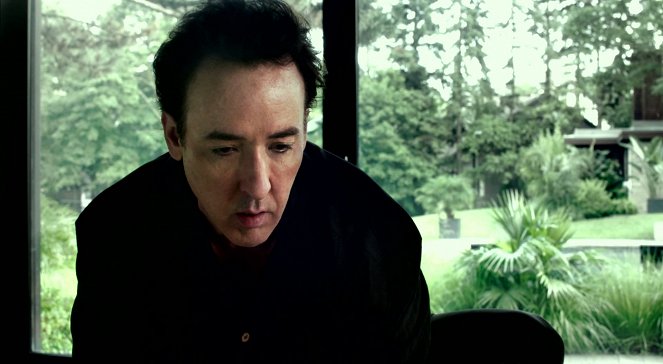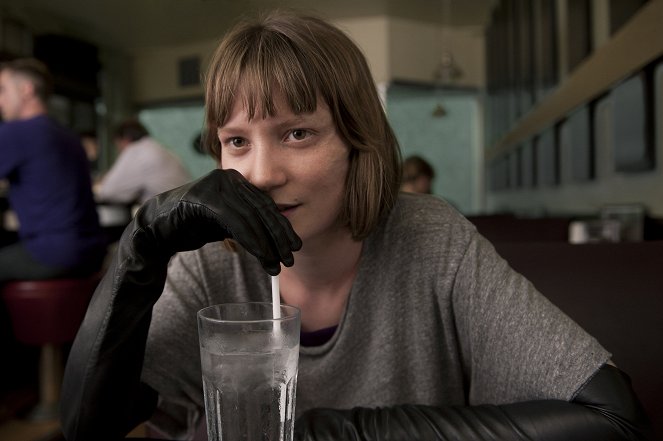Regie:
David CronenbergDrehbuch:
Bruce WagnerKamera:
Peter SuschitzkyMusik:
Howard ShoreBesetzung:
Julianne Moore, Mia Wasikowska, John Cusack, Olivia Williams, Evan Bird, Robert Pattinson, Sarah Gadon, Niamh Wilson, Kiara Glasco, Jonathan Watton (mehr)Streaming (3)
Inhalte(1)
Mit seinem neuen Film gelingt David Cronenberg eine großartig gespielte und inszenierte Gratwanderung zwischen bissiger Satire und Psychothriller.
Die Weiß-Familie passt perfekt nach Hollywood: Vater Stafford (John Cusack) ist Psychoanalytiker und Motivationstrainer, der ein Vermögen mit Selbsthilfe-Anleitungen verdient hat. Mutter Christina (Olivia Williams) hingegen verwaltet die Karriere ihres Sohnes, des 13-jährigen Kinderstars Benjie (Evan Bird). Das schmutzige Geheimnis der Familie ist Tochter Agatha (Mia Wasikowska), die erst vor kurzem aus einer psychiatrischen Heilanstalt entlassen wurde. Aber auch die anderen Familienmitglieder haben ihre Probleme. Stafford ist überfordert mit seiner neuen Patientin, der Schauspielerin Havana (Julianne Moore), die dem Ruhm ihrer Mutter hinterhereifert, daran aber zu zerbrechen scheint. Sie fängt an, Geistererscheinungen wahrzunehmen. Benjie wurde gerade aus einem Rehabilitationsprogramm entlassen, was für Spannungen zwischen ihm und seiner Mutter sorgt, und so bröckelt langsam die saubere, glatte Fassade des Haushaltes.
"Wir finden uns in einem postmodernen 'Boulevard der Dämmerung' wieder, in dem Hollywoodstars, die für immer auf Film verewigt sind, sich inzestuös vermehren wie die alten Pharaonen." (David Cronenberg)
"Zur visuellen Eleganz und der dramaturgischen Finesse gesellt sich ein exzellentes Ensemble, allen voran Julianne Moore." (Programmkino.de)
(Verleiher-Text)
Videos (11)
Kritiken (6)
Cronenbergs Kritik des Kapitalismus sowie der scheinheiligen Gesellschaft voller Täuschung ist so oberflächlich wie Wagners Drehbuch und ebenso gekünstelt wie das digitale Barbecue am Ende. Es ist eine Show von sog. Halbdetails, die im Fall Einer dunkler Begierde ein Bild der Welt als ganzheitlichem Spiegel kreieren, der jedoch allmählich zerpsringt, sich in dieser postmodernen Stilisierung in etwas verzweifelt Anachronistisches und Zahnloses verwandelt. Hierin ist ein Stück vergeblichen Predigens sowie der Unfähigkeit verborgen, bei irgendetwas krankhaftem anzulangen zu machen (über den Rahmen der krankhaften Bemühungen des Drehbuchs hinausgehend). Ein gruseliges Obludarium voller oberflächlicher Karikaturen und Schemata, bei denen wir vom ersten Moment an bis zum allerwertesten Ende hineinschauen können. Bei einem Film, in dem Robert Pattinson die sympathischste und glaubwürdigste Person darbietet, stimmt etwas nicht. Meister, es ist an der Zeit, Ihr Erntedankfest zu filmen.
()
Eine unverständliche Scheußlichkeit, deren Stoff in den Händen von anderen Autoren (Sam Mendes, David O. Russell) mehr als interessant werden konnte. Cronenberg hatte ich einst unter den TOP10 Regisseuren und himmele immer noch den Großteil seines Werks an (einschließlich der widersprüchlich angenommenen Stücke wie Crash). Seine Einzigartigkeit besteht darin, wie verständlich und akzeptabel er pathologische Abweichungen von der "Norm“ darstellen kann und sie noch dazu ein Teil von einer spannenden Geschichte werden lässt. Maps to the Stars war aber ein Fehltritt. Der Film ist ein unverdaulicher Ballast, eine Schau von Figuren, welche allegorisch so weit von der Realität entfernt sind, bis ihre Definition und die Pointe ihrer Interaktionen ins Leere gehen. Ein Stern ist für Julianne Moore, die mit ihrer Schauspielleistung das Publikum auch dann begeistern würde, wenn sie eine grüne Gurke spielen würde.
()
I was expecting a sharp Hollywood satire, but even though it’s a non-Hollywood film about the Hollywood environment, the satire is not as bold as I thought it would be. We get some dialogues here and there mocking the fads and mannerisms of the stars, but it’s mostly a subversive and untraditional movie about relationship with protagonists that are fucked up in a way that not even in Hollywood must be common. Really, such a parade of perverted and self-destructive characters is not something you see every day. Cronenberg is in true form this time, and though fans of his earlier works won’t find much physical nastiness, the inner psychical nastiness is more than enough, to the point that the film won’t be very easy to digest for many viewers, even if it’s told detachedly and with black humour. It’s edgy fun, and it worked superbly for me. 9/10
()
“Secrets Kill.” Cronenberg scrutinises the American film industry as a malignant outgrowth of the industry capitalist system. The relationships between the characters are almost exclusively of an opportunistic nature. Parents give business priority over their children. Friends, even dead ones, serve only for gaining fame, or a role. The human body is seen as a commodity that can be monetised in various ways and kept in good condition by applying the right products. The pathologically narcissistic, self-centred characters are guided by the logic of “everything must be kept in the family”, which is also the defining characteristic of Hollywood and the central theme of the film. ___ Hollywood here is a model of a morally bankrupt society whose members have lost their awareness of the real world and even their own identities. They have become characters in a limited number of constantly varying stories in which they have performed or would like to perform. Cronenberg himself does not make it clear what kind of story we are watching. The narrative is intentionally ambiguous and at least on the first viewing does not make it possible to distinguish where the cruel satire ends and the degenerate family melodrama begins (only on the second viewing will you appreciate how the film works with the motif of blood from the visit of a non-Hodgkin’s lymphoma patient). ___ Agatha’s arrival in Beverly Hills promises the fulfilment of the ”rise-to-stardom” formula about a girl who gradually achieves fame (see, for example, All About Eve). But as suggested by her burn scars (the film’s most obvious connection to Cronenberg’s bodily horror), the girl is not completely untainted by the world of show business and she will clearly not be a passive observer of the excesses around her, which she could subsequently turn into a novel or screenplay. ___ The gradual revealing of how exactly Agatha fits into the web of twisted relationships happens at roughly thirty-minute intervals (after half an hour, she goes to work for Havana; after an hour, she visits Benjie). The gradual doling out of new dark secrets and the disturbing soundtrack, which connects the characters long before we find out how they are connected in reality (Éluard’s poetry, recited by the dead and read by the living, serves a similar connective purpose), keep us in constant suspense despite the (intentional) formalistic rigidity. Almost the whole first hour of the film is presented using static shots of the characters talking. In the second hour, both the relationships between the characters and the camerawork have greater dynamics. From the beginning, the formalistic simplicity and minimalistic mis-en-scène are offset by the characters’ outlandish behaviour. ___ So that it won’t be easy for us to create our own map of the relationships between the stars, not only does the film spend a long time keep important information secret, but the characters also lie to each other (for example, Agatha disowns her father in front of Havana and fabricates a story about how she got burned). As mere media constructs, the film’s characters are not much more real than the ghosts of the past that visit them at night and force them to confront the past that they have obstinately denied and who they really are beneath the caricatures of themselves, to which they have become unhealthily accustomed. Instead of helping them to find answers and inner peace, Cronenberg grants some of them a different wish in the conclusion – to appear in an eccentric arthouse film. This spiteful gesture clearly expresses the director’s distaste for playing by Hollywood’s rules (even if it’s a Hollywood satire), while finally obliging his fans, who see him mainly through the prism of his perverse early works. You will most probably fully appreciate the fact that Maps to the Stars is comparably perverse, though not in the sense of physical repulsiveness, only after a repeat viewing. 75%
()
(weniger)
(mehr)
In Maps to the Stars, David Cronenberg ruthlessly settles the score with nothing less than Hollywood itself and its glamour. This perspective brings disillusionment from a world where ruthless competition, pretense, cynicism, and the pursuit of pleasures prevail. In the chosen viewpoint, Cronenberg is not original; others have also gone after the dream factory in a similar manner. However, Cronenberg can rely on the quality acting of several film stars, led by Julianne Moore. She provides yet further proof that she belongs in the top rankings of contemporary actresses. Her fading film star is able to change all imaginable moods and expressions on the surface offered by the script. Mia Wasikowska, who is a generation younger, skillfully supports her. At the same time, Cronenberg can rely on his intimate knowledge of the environment, and some of his jabs are effective and precise. Essentially, I like his directing style, but one can't help but feel that the mysterious layer of the story is actually unnecessary, and above all, the crazy twist based on incest is contrived and the director could have treated the resolution of his story much more rationally without sacrificing the credibility and effectiveness of the story. A comparison with the famous Mulholland Drive by a different David is readily available, as they both play with the same environment, expressive means, and genre combinations, but the result is not flattering for Cronenberg. Lynch managed to play with Hollywood, genre references, and the viewer much more cleverly, sophisticatedly, and entertainingly. At the same time, I fear that outside the classic festival circuit, Cronenberg will not find much understanding for his perspective on the filmmaking world. Perhaps a note on the genre - labeling this piece as romantic carries the same weight as speaking about romance in the film The Hurt Locker since James really had a passionate relationship with war. Overall impression: 60%.
()



Werbung